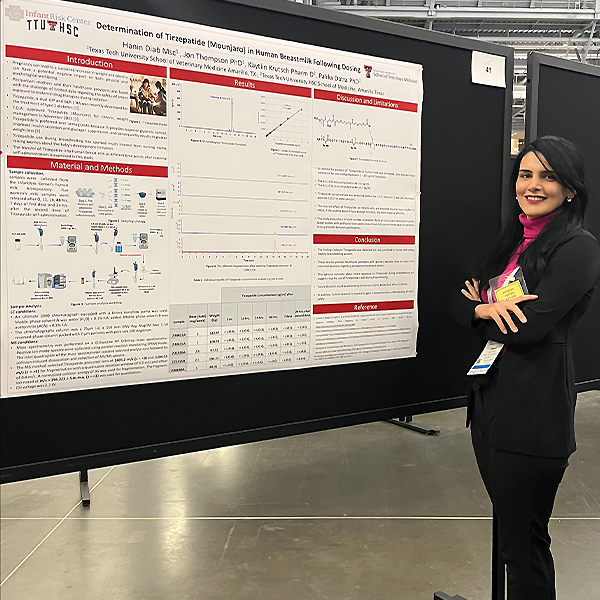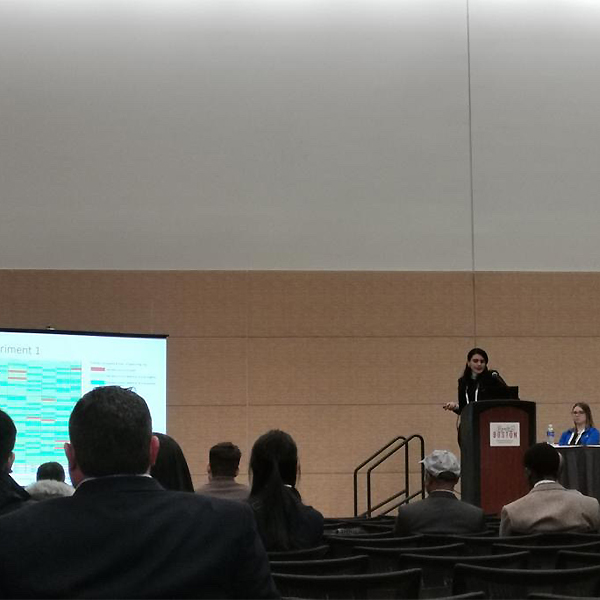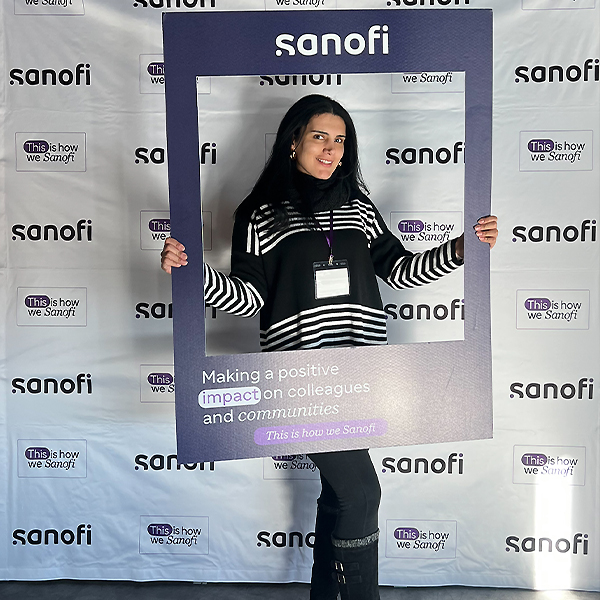
Hanin Diab is using a One Health approach to develop and optimize advanced analytical methods.
As we celebrate Graduate Student Appreciation Week, meet Hanin Diab who is in our innovative Ph.D. in One Health Sciences program. Her passion in analytical chemistry is making a difference in human, animal and ecosystem health. Let’s get to know Diab more through a series of questions.
What are you passionate about in research and One Health?
I am deeply passionate about using analytical chemistry and mass spectrometry to help
solve global health challenges through a One Health perspective. The concept that
human, animal, and ecosystem health are interconnected has fundamentally shaped the
way I approach research. I am especially motivated by the opportunity to develop sensitive
analytical methods capable of detecting drugs, contaminants, or resistance markers
in complex systems. Whether it’s monitoring drug safety during breastfeeding, assessing
veterinary drug residues in food, or evaluating antimicrobial resistance, I am driven
by research that makes a real impact on public health policy and people’s lives. One
Health enables me to bridge the gap between lab-based science and broader societal
needs, and that connection is what inspires me every day.
What inspired you to pursue research?
My research began when I was 10 years old, after discovering the book "Horrible Science."
It opened a world of curiosity and filled my mind with questions, such as: How do
things work? How are materials made? Why are certain substances used over others?
And how do processes occur at the molecular level? As I continued through school,
I found myself especially drawn to chemistry and analytical chemistry, because it
offered logical, structured answers to these questions. My interest quickly evolved
from classroom curiosity into a passion for hands-on problem-solving. Research became
the ideal path to explore that curiosity while contributing to real-world solutions
in health and environmental protection.
What is your research?
My research focuses on developing and optimizing advanced analytical methods, particularly
LC-MS/MS and UPLC-based techniques, to analyze complex biological and environmental
samples. One of my main projects involves detecting and quantifying therapeutic peptides
such as semaglutide and tirzepatide in human breastmilk to evaluate drug transfer
during lactation and ensure safety for both mother and infant. I also developed a
green UPLC-MS method for detecting veterinary drug residues in food, utilizing a microvolume
dialysis probe to minimize solvent use while enhancing sensitivity. In another study,
I developed a chromatographic method to quantify essential oils in animal feed additives
for agricultural quality control purposes. I also contributed to antimicrobial resistance
research by developing an LC-DAD method to assess the effect of cefotaxime on E. coli.
All of these projects align with the One Health mission, addressing health risks that
span human, animal, and the ecosystem.
What opportunities have helped you advance your research?
One of the most valuable opportunities in my research journey was a collaboration
with the InfantRisk Center and the School of Pharmacy at Texas Tech University Health
Sciences Center. Together, we conducted a clinical study on the safety of semaglutide
(Ozempic) during breastfeeding. This collaboration allowed me to apply my analytical
chemistry skills to a clinically relevant question and generate meaningful data that
could support healthcare decision-making. It was incredibly rewarding to be part of
a multidisciplinary team comprising pharmacists, clinicians, and researchers working
toward a shared goal: protecting maternal and infant health. The experience not only
strengthened my technical and analytical skills but also taught me how to effectively
communicate research outcomes for both regulatory and clinical impact.
Why did you choose Texas Tech for your Ph.D. in One Health Sciences?
When I first heard about One Health, I wasn’t familiar with the concept and initially
assumed it was related to public health. However, after researching further, I discovered
that it’s a much broader and more collaborative approach that integrates human, animal,
and ecosystem health. I was inspired by the idea of bringing together multiple disciplines
to tackle today’s most pressing health challenges. Texas Tech University’s School
of Veterinary Medicine’s Ph.D. in One Health Sciences program stood out as a unique
opportunity to combine scientific rigor with interdisciplinary collaboration. It provided
the ideal environment for growth as a scientist and to conduct research that truly
matters to society.
What do you like most about the One Health Sciences Program?
What I value most about the program is its genuinely interdisciplinary nature. It’s
rare to find a research environment where chemists, veterinarians, economists, epidemiologists,
virologists, and microbiologists work side-by-side to solve shared health problems.
In this program, collaboration is not just encouraged, it is essential. Collaborating
with experts from diverse disciplines has broadened my scientific perspective and
equipped me with a more comprehensive set of tools to address global challenges, including
antimicrobial resistance, drug safety, and food quality. The program creates a supportive
and inclusive atmosphere that fosters purpose, innovation, and impactful collaboration.
Can you talk about your internship and how it helped your research?
My internship at Sanofi marked a significant step in my professional journey. Although
I had prior experience in pharmaceutical quality control, this was my first time working
in a global biopharmaceutical setting. I joined the Bioanalytical Characterization
group, where I conducted LC-MS analysis of host cell proteins to support biologics
development under GMP conditions. This experience gave me valuable insight into how
analytical methods are applied in real-world drug development pipelines, from research
through regulatory approval. I gained hands-on experience in method transfer, instrument
qualification, and ensuring data integrity. More importantly, it allowed me to connect
my academic skills to industry applications, reinforcing my passion for translational
research and preparing me for a future where I can contribute to both innovation and
patient safety.
How has the school helped you become a better researcher?
Texas Tech has played a significant role in shaping me into a stronger, more confident
researcher, both technically and professionally. Through intensive training in analytical
chemistry, access to advanced instrumentation, and hands-on experience in method development
using LC-MS/MS and other tools, I’ve developed key skills in experimental design,
data analysis, and scientific communication. I’ve also participated in interdisciplinary
projects that tackle real-world challenges, such as antimicrobial resistance and drug
safety, which have helped me understand the broader implications of my work.
What truly sets Texas Tech apart, especially within the School of Veterinary Medicine, is the environment. It’s unlike any place I’ve been before; it feels like a family. There is a strong sense of belonging, collaboration, and shared vision. Faculty and mentors are incredibly generous with their time and knowledge, and their doors are always open to students. That openness, encouragement, and commitment to growth have made a tremendous impact on my development. It’s an environment that nurtures curiosity, resilience, and excellence — qualities essential to becoming not just a good researcher, but a great one.
What do you hope to do after graduating?
After graduating, I hope to continue applying my expertise in analytical chemistry
to research that supports public and ecosystem health. My goal is to contribute to
research initiatives that improve drug safety, monitor environmental exposures, and
address emerging health threats using science-based approaches. Whether in academia,
industry, or a public agency, I want to lead or collaborate on projects at the intersection
of human, animal, and ecosystem health. I hope to use the knowledge and skills I’ve
gained to develop practical methods, generate meaningful data, and contribute to advancing
the mission of One Health on a broader scale.
